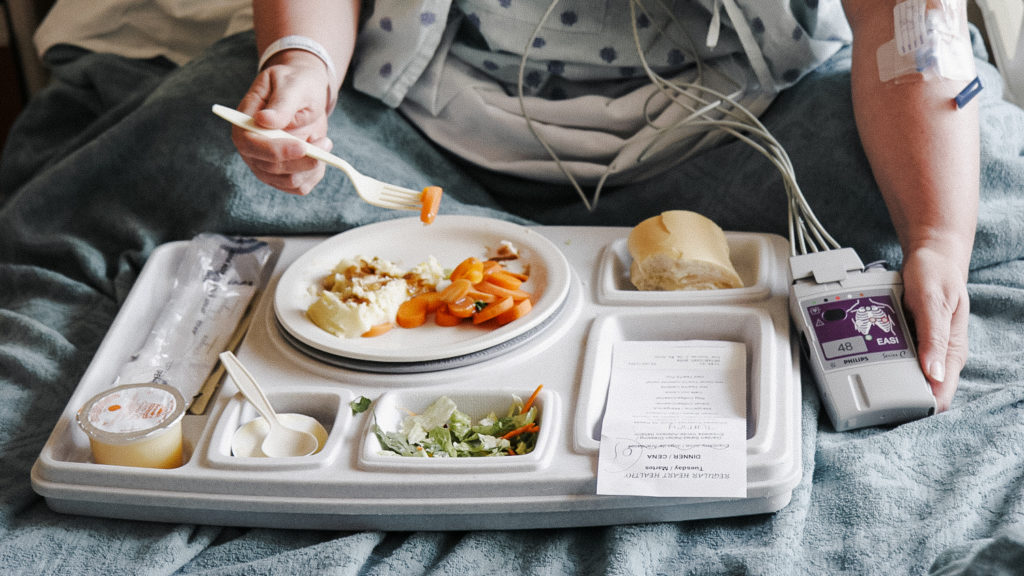Eating vegan at the hospital might be about to get easier in Oregon.
As reported by Eugene Weekly, Oregon House Representative Marty Wilde introduced House Bill 2348 in January. The legislation will help Oregon residents in hospitals, long-term care facilities, and prisons have access to vegan meals.
Wilde introduced a similar bill during the 2019 legislative session. It died in the Oregon Senate after passing with bipartisan support in the state House.
Though a current version of Wilde’s bill would also prohibit processed meats at hospitals, which was enough to warrant criticism from some conservative blogs, Wilde advised that the bill’s language will soon change.
He noted that processed meats were intended to be prohibited unless requested by a patient. He clarified that the bill is designed to preserve healthy, ethical choices for people in residential care and hospitals.
100% Vegan Meals At No Extra Cost
Per the current text of the bill, “a hospital or long-term care facility shall make available to patients, residents, staff and visitors 100 percent plant-based meals and 100 percent plant-based beverages that are low in fat, sodium and added sugars.”
Additionally, the bill stipulates that meals must be marked as plant-based. Hospitals and long-term care facilities must also offer the meal at no additional cost beyond a comparable dish that isn’t vegan.
A separate section of the bill addressing the prison piece states: “The Department of Corrections shall make available to all adults in custody in department facilities 100 percent plant-based meals as an option any time a meal is served.”
The legislation defines a “100 percent plant-based meal” as being devoid of any animal products, including dairy, eggs, and honey.
Wilde told Eugene Weekly that the bill intends to protect a person’s choice to eat a diet free of animal products for reasons of religion, ethics, or health when ill or incarcerated. “This is to keep the substitution of cheap processed meats for healthier options,” he said.
As for what a plant-based meal for an incarcerated person in Oregon might look like, Michael F. Gower, assistant director of operations for Oregon’s Department of Corrections, explained the available meat alternatives in testimony for the bill. He said adults in custody can receive an eight-ounce bowl of beans for an entrée. But clarified that the meal includes animal byproducts such as eggs and dairy, so it’s not entirely vegan.
The breakfast protein replacement, Gower said, is four tablespoons of peanut butter.
The Rise of Vegan Food in Hospitals and Prisons Across The Globe
Many prisons around the United States and abroad now offer vegan meals. In September 2018, California Governor Jerry Brown signed into law a Senate bill that requires a vegan option on the menu at state prisons. It also requires the option for nursing homes and hospitals.
In August 2020, the San Francisco Board of Supervisors voted to dramatically reduce the number of animal products served in jails and hospitals in the city. Under the new guidance, jails must cut their purchase of animal products in half by 2024. Public hospitals must reduce the number of animal products purchased by 15 percent by 2023.
The Vegan Society released a guide in July 2018 offering inmates advice on how to be vegan in prison. It notes vegan prisoners in the UK have protection “under human rights and equality law.”
“This means that prisons have an obligation to ensure that they do not interfere with a vegan’s right to freedom of conscience,” the guide adds.
“[They have] a responsibility under the Equality Act 2010 to avoid any discrimination on the grounds of veganism.”

The Nutritional and Practical Benefits of Vegan Food in Prisons
It’s not entirely clear why vegan meal options are on the rise in prisons. But one reason could be because plant-based dishes are typically healthier than their processed counterparts.
In fact, the Osteopathic Physicians and Surgeons of Oregon testified in favor of Wilde’s HB 2348. The organization noted that for every 10 grams of fiber (only found in plant foods) added to one’s diet, the risk of heart disease and colon cancer reduces by 10 percent. By contrast, the processed meat that’s typically a portion of Oregon (and many other) prison meals was classified as a type 1 carcinogen by the World Health Organization in 2015.
In December 2019, the NYC Department of Correction introduced Meatless Mondays for its correctional officers, general jail staff, and inmates. Correction Commissioner Cynthia Brann noted that the change was more nutritious and kinder to the planet.
“We are also proud to be encouraging a healthier planet with less of a carbon footprint,” she said at the time. “Our hope is that individuals leave our custody more mindful of the benefits of a reduced meat diet. Both for themselves and for the planet.”
Vegan dishes are suitable for those with allergies to milk or eggs, as well as those with religious restrictions. Many prison systems view them as an easy way to streamline mealtime. This can often cut down on costs and save money. In August 2020, for example, the Arizona Department of Corrections (ADOC) replaced Halal and Kosher food with plant-based meals.
“The new Common Fare Meal provides accommodations and the ability to be more inclusive for the changing dietary needs of those incarcerated,” Bill Lamoreaux, a spokesperson for the ADOC told the Phoenix New Times at the time.
In addition, as The Counter reported in 2018, vegan meals can actually be lower in cost than their traditional counterparts. They also pose fewer foodborne illness risks.


